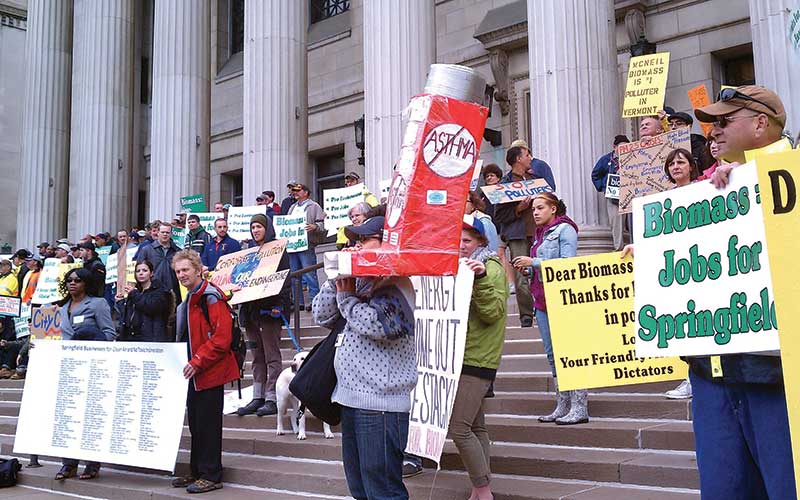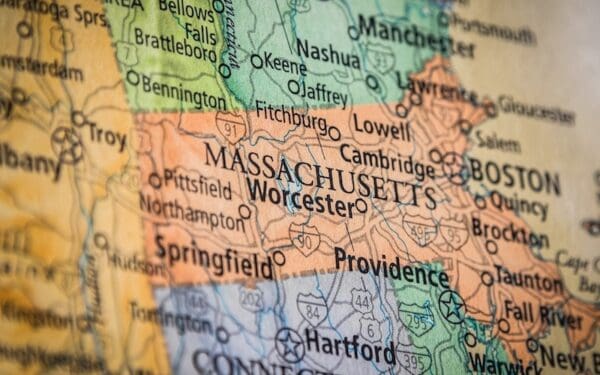
“This is what environmental racism looks like.” The fight to stop the Palmer biomass plant has taken more than 10 years – and it isn’t over just yet. Photo: Courtesy of The Republican
Update, October 2024:
In 2021, a permit needed to build the Palmer biomass plant was revoked by state officials. Palmer appealed that decision in an effort to have it overturned. In 2022, Palmer lost that appeal. Palmer is now appealing before the Massachusetts Court of Appeals. CLF is going to court to protect Springfield’s right to clean air.
We’re revisiting our 2021 conversation with Tanisha Arena, executive director of Arise for Social Justice, about why this fight is so important to the community.
Now that a key permit the plant needed has been revoked, it seems this biomass plant project may finally be on its last legs. Why has this fight taken so many years?
Arena: [The siting of the Palmer Renewable Energy biomass plant] is what environmental racism looks like. Is it about money? Yes. Is it about this community that is primarily Black and Brown? Yes. And it’s about how this country has historically treated Black and Brown people. So it’s no big deal to put this plant here and violate your rights, which this country hasn’t really felt that we [Black and Brown people] had legitimate rights, anyway.
Springfield is also a designated environmental justice community, which means that there have already been systemic and institutional harms. There are people here who can’t go out of the house because the air is not good, so why were they [Palmer Biomass] going to intentionally make the air quality worse by putting a biomass plant here?
How did you talk about the plant to people outside of Springfield to mobilize opposition?
Arena: [We needed people] to connect the dots between colonial values, white supremacy, and abuse, because colonization is rooted in abusive values. At the last biomass rally, I said that someone not respecting your “no” is the first step in abuse. And this community had said “no” how many times? And yet, here we were, on and on and on.
[Palmer] tried to explain it away by saying that [biomass] is clean energy and it’s renewable, but you can’t burn anything and have it be clean. That’s an elementary school science lesson.
We had to shift the narrative to get people to think about what this is actually doing to people and how we’re all connected to it. We needed people to connect the dots and say, “Wait a minute, this is not going to be okay, and not just for the people here.” Springfield is ground zero, but it’s going to affect you, too. Because you’re not exempt. The smoke doesn’t know to stay in the smoking section – that’s not how this works. [The plant pollution] is coming to your town. What happens in Springfield affects what happens in Amherst and Leverett and even Boston and vice versa.
Springfield has one of the highest asthma rates in the country. But how do you want people to think about the community, outside of that dire moniker?
Arena: We’ve been the asthma capital of the United States, but how have we managed to overcome that? You’re talking about people that run businesses; the kids are resilient, the arts are booming. There are colleges here, so young people are coming, and they’re getting a world-class education. That is a testimony to the people that are here. It’s more than just the asthma capital. There are people here who are building their lives and raising their kids and thriving in spite of it.
Dig Deeper
Through community lawyering, CLF contributes its skills and strategy to support initiatives identified by and with community members. The long fight against the Palmer Renewable Energy biomass plant is one of several community lawyering projects CLF has undertaken. With Palmer appealing the State’s revocation of its air permit and the City Council’s revocation of its building permits, our legal advocates continue to work alongside residents and support the City Council to stop the polluting plant for good.



